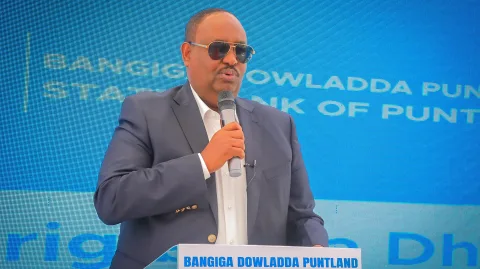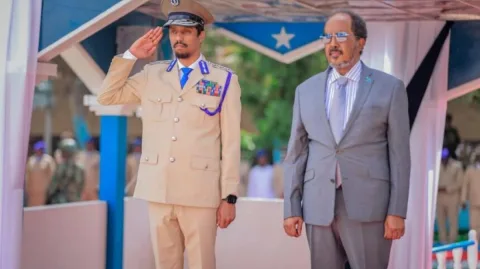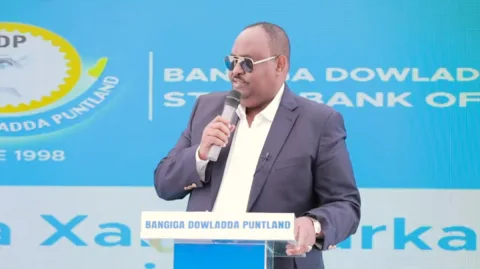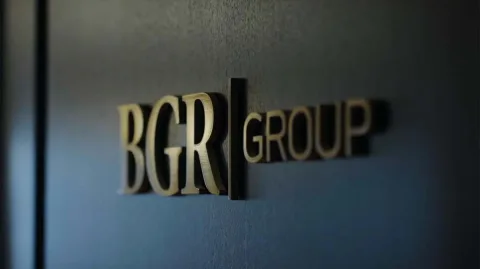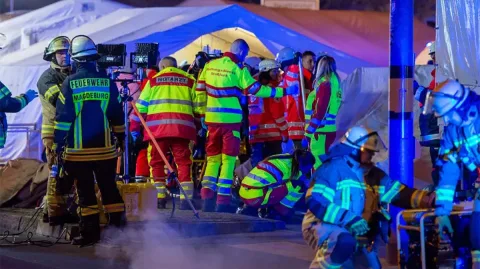Tens of thousands of people have died as the result of severe drought in the Horn…

Tens of thousands of people have died as the result of severe drought in the Horn of Africa, and hundreds of thousands have been made refugees, looking for food. The international community has stepped in, but emergency aid is only a stop-gap measure. Somalia is the worst affected country.The Netherlands is doing its part to ease Somalia’s current humanitarian crisis. The bigger question is how to help the shattered country emerge from 20 years of civil war and poor governance.
Dutch Deputy Minister for Development Aid Ben Knapen paid a brief visit to the Somali capital Mogadishu earlier this month (main picture), and said he would make another 10 million euros available for emergency aid.
EU Envoy
But he wants to do more. Mr Knapen says EU donor countries need to work together more efficiently, and is calling for an EU representative for the Horn of Africa to oversee the coordination of aid. In particular, he listed four areas where European countries could co-operate more efficiently: food aid, controlling the flow of refugees, fighting piracy and counter-terrorism.
“If you add this all up it could be useful to have a special envoy for the Horn of Africa whose job is to make sure the left hand knows what the right hand is doing.”
Tough
Aid to Somalia is difficult and complex. Since Mohamed Siad Barre’s government fell in 1991 and the withdrawal of US forces in 1994, the international community has struggled to find a way to help the country. In 2004, the Transitional Federal Government (TFG) became the focal point of international aid. But the TFG never managed to gain legitimacy in Somalia itself, and is now caught up in a struggle with the Islamist group al-Shabaab. Even with the help of African Union soldiers, the TFG does not control much territory outside Mogadishu.
 So now the Netherlands has decided to embrace the so-called two-track approach to helping Somalia – continuing to provide assistance to the Transitional Federal Government, while at the same time finding ways to help local authorities. The Netherlands has already helped fund the construction of a parliament building in the autonomous region of Somaliland.
So now the Netherlands has decided to embrace the so-called two-track approach to helping Somalia – continuing to provide assistance to the Transitional Federal Government, while at the same time finding ways to help local authorities. The Netherlands has already helped fund the construction of a parliament building in the autonomous region of Somaliland.
Bottom up
Green Left MP Arjan el-Fassed is pleased with the new approach: “The Dutch government has been investing in the transitional government. We’ve seen that it has failed miserably. And we know Somali society is made up of tribes and clans, and in such a situation the more you invest in central authority, the more you aggravate conflicts at the local level. That’s why it’s better to build up from a local level, rather than from top down.” If anything, Mr el-Fassed wants to see even more of the bottom-up approach.
Not far enough
A development aid worker who frequently travels in Somalia went even further (he asked to remain anonymous to protect the people he works with there). He told Radio Netherlands Worldwide that the international community should stop working with the TFG altogether. He says the TFG and the African Union forces in Mogadishu are corrupt, that infighting is rampant, and that they are committing human rights abuses. It is difficult to distribute aid in TFG-controlled territory, he continued, and foreign investors say they actually prefer doing business in regions controlled by al-Shabaab.
 But the Netherlands, along with the European Union, continues to support the TFG and the African Union. Deputy Minister Knapen says he is pleased that the AU forces have driven ‘the terrorists’ from Mogadishu. But in the search for a short term solution to piracy, terrorism and refugees, the Netherlands and the EU run the risk of trying to place the transitional government in the best light possible. Thereby making a long-term solution to two decades of lawlessness in Somalia even more unlikely.
But the Netherlands, along with the European Union, continues to support the TFG and the African Union. Deputy Minister Knapen says he is pleased that the AU forces have driven ‘the terrorists’ from Mogadishu. But in the search for a short term solution to piracy, terrorism and refugees, the Netherlands and the EU run the risk of trying to place the transitional government in the best light possible. Thereby making a long-term solution to two decades of lawlessness in Somalia even more unlikely.
(rk)

Source: RNW

